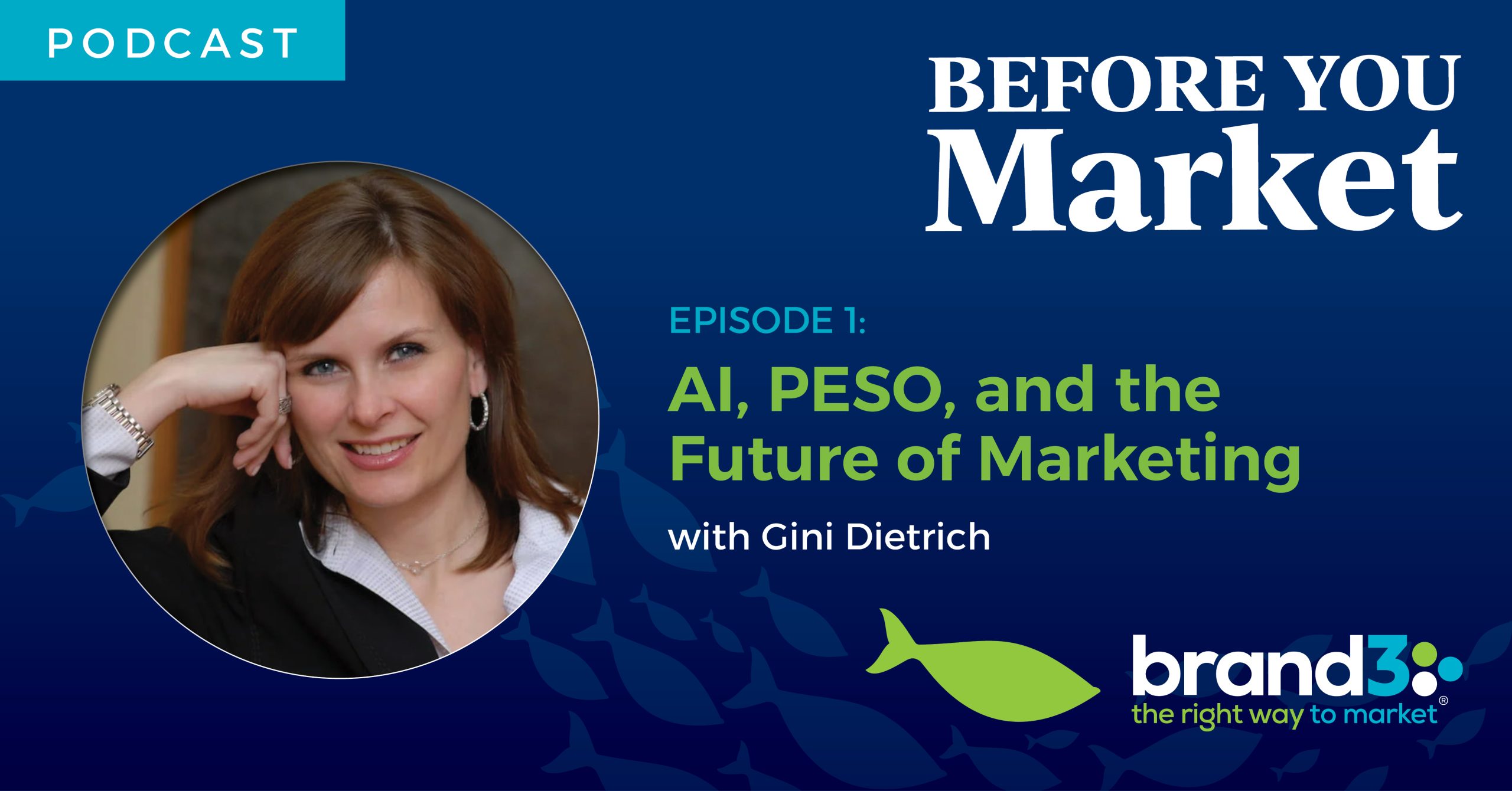

Welcome to the Before You Market Podcast, where we challenge you to “Rethink Marketing.” In this episode, we get to hang out with Gini Dietrich, one of the top PR and marketing minds in the industry! We dive into some exciting topics, including:
(edited for readability and humans)
Jon Bailey 00:01
So then I told her, you know, what are you going to do with all that cheese anyway? And she said, I don't know. Okay, and we're recording. Okay, ready and yes, all right. Welcome to the Before You Market podcast where we challenge you to rethink marketing.
Gini Dietrich 00:27
Rethink marketing. Look at that. I want a shirt, we should’ve done it at the same time. Dang it.
Jon Bailey 00:32
I know right, to help us in this endeavor to rethink marketing. We've tricked, I mean, invited some of the best marketers in the business to break you off some knowledge, this one definitely doesn't feel like work, because I get to hang out with my friend Gini Dietrich, who is one of the greatest PR and marketing minds around, and just, you know, a wonderful person. So that checks in the mail, right? By the way?
Gini Dietrich 01:01
It is. I think so. Yeah, it arrived last night. I just haven't deposited it yet. So don't cancel it.
Jon Bailey 01:03
Yeah, yeah, sure. So, so, Gini, please take a moment and introduce yourself to these, these fine people.
Gini Dietrich 01:14
I don’t know if I can do better than that.
Jon Bailey 01:18
Just, let's, let's give it a whirl. Let's see what you come up with, I'll judge you afterward.
Gini Dietrich 01:24
Okay, 10, we're in the Olympics right now. 10, thank you. I'm Gini Dietrich. I actually own a company called spin sucks. I started it as a blog and then wrote a book, and then it became professional development for communicators and marketers. So we do online courses and workshops and training and coaching and all that kind of fun stuff. I also have an agency on the other side of the business, which isn't this fun to talk about.
Jon Bailey 01:54
Fair enough. Fair enough. So as you know, I have been a fan of yours and of spin sucks for well over a decade now. Oh, come on, you're not it's, it's, it's a blip. I'm very excited to share you with the Brand3 audience. And of course, as usual, we'll get down with some peso. So let's get rolling. So, AI, yes, everyone is talking about it. It's kind of annoying. But, you know, let's talk about AI.
Gini Dietrich 02:34
Why is it annoying? Because everyone's talking about it?
Jon Bailey 02:37
Because everyone's talking about, yeah. Mostly. So I'm curious to hear your thoughts on how you think AI is impacting the PR industry, and maybe how marketers can take advantage of that.
Gini Dietrich 02:53
I think AI is incredible. I love it. I'm very excited about it. The only thing I don't like is that it doesn't do my dishes or laundry yet, but, I hear it's coming. So.
Jon Bailey 03:03
Come on, robot overlords.
Gini Dietrich 03:05
That, and self driving cars. I need. So let's put AI to good use, please. Yes, I love it. I think, from a PR perspective, you know, so many people in my industry kind of wring their hands and are, like, it's going to replace us. It's going to take my job. And, you know, it can create content and all those kinds of things. And yes, it can do those things. Is it as good as a human No? Does it give you a great starting point for sure?
Like, one of the things that I did is, I'm writing the second edition of spin sucks right now. And so I put the table of contents for the first edition into AI, and I said, Give me a new table of contents based on what's happened in the last 10 years since this was published. And it wasn't perfect, but it at least gave me a starting point of where you know things to think about. And then I said, Okay, now provide some research, some studies, and some experts to quote, that fit into this outline. And some of it was bad, and I was like, this is not helpful.
I'm writing the book. But there was some stuff in there that I hadn't considered. And so I think just being able to use it from the perspective of this gives us a starting point. It helps us think about things in a little bit different way. It gives us new ideas. But it's not the end all be all like I couldn't take everything that it gave me and make it into the table of contents for the new book, but it did give me some new ideas to consider.
Jon Bailey 04:39
And then how do you, how do you see it like impact in the PR industry? Is it, a good thing for them? Is it a bad thing? Is it kind of just more of the same, where it's just kind of helping them along?
Gini Dietrich 04:52
No, I think it's, I think it's good, you know, I there's a couple things that I think about from a PR perspective. And one. Is that, you know, Chris Penn actually said this probably 10 years ago. He said, when you think about AI in the future, you should think about it as an orchestra. And that has always stuck with me, because now we've become, we can become conductors of our own, own orchestra.
So we have AI that does content development, we have AI that does social media ads, we have AI that does social media posts, we have AI that does video we have AI to do all those things, and we're conducting that orchestra to get it to output what we want and what we need. So that's sort of how I see it moving forward, is that's, that is what we'll we'll do. We'll become really good at prompting. We'll become really good at taking what it gives us and improving upon it and adding in our expertise and our experience. But that's how I see it, affecting the way that we do our jobs, and how the industry will evolve. And it's not any different than anything else like the internet changed the way that we do our jobs. Social media change the way that we do our jobs. This is another way to change the way we do our jobs.
Jon Bailey 06:04
It's another tool in the tool chest. So, as promised, I want to talk about peso. So peso is now 10 years old, so you must be a very proud, proud mommy.
Gini Dietrich 06:18
Same age as my real kid too. That's crazy, right?
Jon Bailey 06:20
So please explain what peso means and why, in your opinion, understanding the PESO model is critical for marketers today.
Gini Dietrich 06:31
Peso is critical. Peso is paid, earned, shared and owned media. So it takes those four media types and on their own, they work perfectly well, right? But the peso model takes them and integrates them together, and where the real magic happens is when the four are integrated together and working together, but also where they overlap.
So, you know, in my industry, you have paid and earned working together. Because you have influencer marketing, you have to pay for play, unfortunately, with some media outlets where you have to pay for stories. Today you can't get on CNBC anymore without paying for it. So you see, you start to see some of that overlap in things like that paid in social you see overlap with Google ads and with social media ads and things like that. So that's where the real magic happens.
So one of the things we talk about at pretty great length is it's fine for you to do content, it's fine for you to do social media. It's fine for you to do PPC, it's fine for you to do media relations. How can you integrate those to have an even bang, bigger bang for your buck, and be more strategic?
Jon Bailey 07:36
And so peso is, is basically what you're arguing and, I mean, you guys go deep, is really that integration, that's the key, the overlap, that's the key. And don't worry, people in the show, in the transcription, will include all the graphics and links to all the great stuff. So, so kind of staying on the peso train. And this is a, this is an obnoxiously long question, so stay with me here in the overview of the PESO model, which is on your website, spinsucks.com, you say when it's implemented correctly, it showcases experience, expertise, trust and authority for the organization and its people.
Now I'm assuming that this references Google E-E-A-T, which is a four way test that Google uses to value content and it value and it bases that test on experience, expertise, authoritativeness, they had to say authoritativeness, the whole right, and last, but certainly not least, trust. So my question finally is, what impact do you see AI having on eat as a measure of quality? In other words, will AI make this more or less important regard regarding the content you create, promote and share?
Gini Dietrich 09:07
The way I think about this is, if you're creating content that demonstrates experts, your expertise and your experience, that automatically, no matter if it's Google or Yahoo or being or AI is going to help you create authority and trust. So yes, that is the Google four way step at looking at whether or not the content is good enough to rank. But I think it affects everything that you do. It affects how people, human beings view you. It affects how robots view you, how the spiders view you.
So if you are always demonstrating that experience and expertise, and that goes to you know, you're creating content with AI, if you can't take what AI has has output to you and include your experience and expertise, you're going to sound like everybody else, and it's not going to be valuable.
So always think about, how can we add our organization's experience, and how can we add our subject matter experts expertise into this to make it unique and interesting and valuable to our audience? Because if we do that, it won't matter if the algorithm changes or search GPT takes over Google or whatever happens in the future, you'll always have really good content.
Jon Bailey 10:24
And the interesting thing is that you're saying this about the P, the E, the S and the O, not just you know, the content that you create, but also the content that you promote, yes, to showcase your experience, expertise, trust and authority. And that, to me, is where, you know, I think a lot of marketers miss the boat that they don't, they don't get that, and then they're just pushing out junk, yeah, in their paid stuff, and they're missing a huge opportunity, huge. Do you agree?
Gini Dietrich 10:56
I agree with that. And one of the things that I've noticed of late, which is a really terrible practice. But somebody along the line, and it may have been, I like one, I may be one of them, but somebody has said, along the lines, comments on content, and that if you do that, it's valuable, because if you're if you're trying to work with an influencer, and you comment on their content automatically, you bubble to the top if you're doing media relations and you're trying to get the attention of a journalist.
If you comment on their content automatically, you bubble to the top if you have prospects on your list that you can't get in front of through the normal channels, email, phone, call, whatever it happens to be, comment on their content that said it has to be real and thoughtful commentary. It has to showcase your experience and your expertise.
So what I am seeing, and I'll bet I publish a LinkedIn newsletter once a week, and I'll bet every week, I get between five and eight AI generated comments where somebody at an agency has said, summarize this content and write a comment for me. And number one, you can tell because it sounds like a robot.
And number two, it doesn't demonstrate the experience and expertise. So automatically, you may be bubbling to the top, but you're getting on a different list of than you want to be on. You want to be on the Hey, I'm, I'm, I want to work with this person or this team or this business. You want to be on that list. And instead, you're getting on the Do not ever talk to these people list.
Jon Bailey 12:31
Yeah, exactly. And in all fairness, I firmly believe that when you did say that it's a good thing to comment on people's stuff. You did say also that do it thoughtfully and and showcasing your own expertise and experience.
Gini Dietrich 12:52
I know it's hard. There's lots of stuff to read and watch and listen to. I get it. I understand.
Jon Bailey 12:57
I think the more important point is that you are guilty of giving good advice. So there so staying with, staying with, with Peso and specifically, really, specifically the P but the platforms constantly give us new ways to do all four, really. But I'm curious what is, what you think is the most interesting paid media option you've seen lately?
Gini Dietrich 13:35
Metaverse. Honestly. You know, I hate to say that, not super me. I'm not high on that yet. Um, the ability and and I see this. It's not, I don't see this in my own business, but I see this with friends that I'm associated with, like my hairdresser. She has used Tiktok to build a store that she generates a like five grand a month from, from that.
I mean, it's selling things like, I really like this back scratcher. Here's my store. Go buy it, and then she gets, I mean, so it's, it's the affiliate marketing piece of it, of the paid model that it's just astounding. And all she's doing is posting about a dumb back scratcher or a brush that she likes. She has this brush that she loves, and she sells like $500 a week worth of brushes.
Jon Bailey 14:35
That's insane. Yeah, yeah, yeah. I don't even know where to go with that. That's wild from a business standpoint. Do you think, do you think businesses are possibly missing certain paid opportunities out there?
Gini Dietrich 14:54
I mean, yeah, I think that businesses miss a lot of opportunities because we're. Afraid of risk, we're afraid of change, we're afraid of all these things, right? I also think businesses tend to go too much into one, one or two things, or they say, Oh my gosh. Well, we have to be on Tiktok and Instagram and LinkedIn and x and Facebook and blah, blah, blah, and you don't have to do that either, but be really smart about what's available, and it doesn't cost a lot of money or a lot of risk to test, you know, just take something small and test it.
Like, for instance, we have a client on the agency side that wanted to test email marketing, and we were kind of like, we don't think this is going to work. And we we described why, just, they just don't have the right business for it, and and they said, Well, can we just take a small subset of the audience and try. And we did, and it didn't work, but it gave them the data, yeah, now they know.
Now it's not just Gini and her team saying, Yeah, that's not going to work. Now they have the data to show. Okay, we tried that, and here's it didn't work, and here's why. So it doesn't cost a lot of money or a lot of risks to do that. So test different things, but don't, don't avoid just because you're you don't want to take risk or make change.
Jon Bailey 16:05
Yeah, agreed, agreed. But I think it's also important. I think it's, I think it's important to and tell me if you agree with this, but I think, you know, especially with the PESO model, I think it's important that you consider brand and your brand and your overall brand strategy, and then how brand plays, how your brand is going to play on these different channels, for sure, and think through that, think through that experience from the client's perspective, absolutely okay. Because, yeah, yeah, I think, I think that's probably one of the biggest mistakes that that many businesses make is they don't. They don't think about they don't. They're not thinking about brand and brand strategy. They're thinking about just sales. Do email, sales and sales. Yeah, yeah.
So finally, I have a question from our very own Tav Laskauskas, who's our badass marketing services director, and one of my all time favorite people, and also my fellow Frederick Maryland homie, yeah, yeah, she's, she's in my town, so her question is, and I'm going to read it okay, is AI a help or a hindrance to the PESO model. If it is a help, do you have a preference for certain AI tools? If it is a hindrance, how do you combat the constant pressure to use AI?
Gini Dietrich 17:32
I think it's a help, as probably you would have guessed. I knew that because it does like when so I actually redid the content in the pace on model certification earlier this year, and I added AI into certain parts, like when you're researching keywords to develop content around. It's really helpful there, when you are researching journalists for your earned media outreach.
It's really helpful there, when you have your keywords for content development, and you need to develop an editorial calendar. It's really helpful there. When you are thinking about how you're going to build many campaigns around your content for social it's really helpful there, when you have your data, you can pull your data into AI and ask it to analyze the data for you, which is a not a strong suit for most communicators. So having that tool at their fingertips is really helpful.
So when you think about it, you have all of these opportunities to use it, a to to make things more efficient, and B, to give you information that you wouldn't necessarily, either you you would take hours and hours and hours to research on your own, or you wouldn't necessarily, necessarily think about so it's a, I think it's just a, it's another tool to be able to help you be more efficient at things.
Jon Bailey 18:55
I mean, that could have been the whole interview right there. That was, I love it.
Gini Dietrich 19:01
I think it's great. I don't see I understand why people are scared, but if you are using it to enhance the work that you do, it's not going to replace you. Your job will evolve, for sure, but you will not be replaced.
Jon Bailey 19:16
And if your job's not evolving, then you're probably either working for the wrong company, or you're not in the marketing industry, because it's just constant, constant, yeah, yeah, yeah. Well, no, I say I'm sitting here rethinking my whole strategy about writing questions for these interviews, because I think tabs was way better than mine. But don't tell her I said that. Yeah.
So well, Gini, as I expected, and as I'm sure all of these people have come to the conclusion of, I think, and I don't know if that was grammatically correct, but I don't care. I think this was great. There was a lot of great stuff in this, and I really don't care either way, because I got to hang out with you, but thank you so much. Is there anything you want to pimp or promote before we before we roll out?
Gini Dietrich 20:15
No, we have something coming this fall, but I, I'm not prepared to speak about it yet. So, so exciting, very exciting.
Jon Bailey 20:22
All right, everybody, stay safe and have fun and you know all that good stuff. Thank you.






MAILING LOCATIONS
1200 Agora Drive
Suite C #307
Bel Air, MD 21014
OFFICE LOCATIONS
Havre de Grace, MD
Seattle, WA

